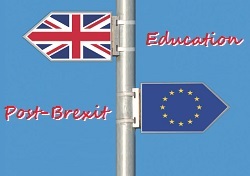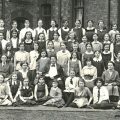Post-Brexit Education: cultural values or valuable transplants?
 Brexit was supposed to cause economic disasters and possibly even world war 3, so I deduced it might also impact on our schools. I searched for information – schools were hardly mentioned. Is it possible that our education system is somehow insulated from the promised consequences of Brexit? After all, people like Maria Montessori, an Italian, Jean Piaget, a Swiss and Jean-Jacques Rousseau who worked in France, and many others have profoundly influenced our thinking about primary education, although the countries of the EU show considerable variations in educational provision. The age at which children start school varies from 4 to 7 years; school types vary and the length of the school day and year are different. In terms of international comparisons the outcomes of education vary too. England is the 8th highest spender on education yet is 23rd in the league tables of achievements, while Finland spends less and is always nearer the top. Countries in South East Asia are usually top.
Brexit was supposed to cause economic disasters and possibly even world war 3, so I deduced it might also impact on our schools. I searched for information – schools were hardly mentioned. Is it possible that our education system is somehow insulated from the promised consequences of Brexit? After all, people like Maria Montessori, an Italian, Jean Piaget, a Swiss and Jean-Jacques Rousseau who worked in France, and many others have profoundly influenced our thinking about primary education, although the countries of the EU show considerable variations in educational provision. The age at which children start school varies from 4 to 7 years; school types vary and the length of the school day and year are different. In terms of international comparisons the outcomes of education vary too. England is the 8th highest spender on education yet is 23rd in the league tables of achievements, while Finland spends less and is always nearer the top. Countries in South East Asia are usually top.
The European Union leaves education matters to individual member states. Every country can choose how best to teach their children and what curriculum to set. However, EU policy is to ensure our children become employable in jobs across the continent and some commentators recognise a focus on the ‘Europeanisation’ of our schools and ensuring children feel ‘more positive’ towards the EU. Others worry about initiatives which seek ways to ‘harmonize the curriculum’ across the EU.
In the 19th and 20th centuries when most European state school systems were established, governments pursued the cultural, national, social, and ideological goals which they thought appropriate. Decisions about what sort of education system to develop were driven by the cultural values and beliefs of the country making them and so the differences emerged. Now it is accepted that the content of the school curriculum always depends on local and national values and beliefs.
Many Mediterranean countries value social and communal relations highly and so families are startled at the idea of putting young children to bed in the early evening instead of encouraging them to interact and participate in the life of their extended families and sleep after 10pm. It is not unusual for parents in South East Asian countries to play English language recordings to children as young as two months because they believe it is never too early to begin learning. Children in Finland grow up accepting that since no-one else speaks Finnish, it is essential for them to master two other languages if they are to succeed in life. Finnish culture also values high levels of motivation in pursuing personal interests, so their educational system provides many opportunities for personal choices about what is studied and to what level.
Korea has achieved 100% literacy in its population and is at the forefront of international achievement testing. There is no belief in talent since the culture assumes that you will become clever enough if you study hard enough. This creates pressures on children which we might find unacceptable. The main role of parents is as educators and the role of children is to respect parents and repay them by making enormous efforts to succeed. South East Asian class sizes are often large as the expectation is that teachers will create and lead a learning community. In England we focus on the development of the individual and therefore value smaller class sizes.
One common factor in the countries which top the league tables is the high regard in which teachers are held. They are well trained, often for longer than in the UK, and are regarded as professionals alongside doctors, lawyers and accountants. Only the highest level graduates are selected for teacher training. Those countries also have high expectations of teachers who often are far more accountable to parents and to their employers than in England. They are also required to study while in service to obtain advanced diplomas and Master’s degrees which then determine their career prospects and salaries.
So different countries produce different systems to suit their own beliefs and purposes. This raises the question of whether it is possible to learn from and even transplant some of the methods employed in other countries to improve attainment in our own schools.
The Government wants the Asian ‘mastery’ approach to teaching maths to be used in our primary schools. £41 million is being provided to assist schools to adopt the approach, which is used by some of the leading performers in maths, including Shanghai, Singapore and Hong Kong. Maths mastery involves children being taught as a whole class, building deeper understanding of mathematical structures, supported by the use of high-quality textbooks. The approach is already used in a number of schools following teacher exchanges between England and Shanghai. Already critics are questioning the wisdom of such an approach. A professor of primary education has commented that it undermines our own culture and heritage which values creativity and originality more than conformity.
So can transplants like maths mastery succeed? If we listen to commentators about some of our own cultural values and how they affect the educational achievement of our children, then it is perhaps unwise to be over optimistic. One expert in solving problems of under –achievement comments that “a toxic peer group culture causes the lack of aspiration among our young people from disadvantaged backgrounds”. He also insists that we have left our young people in a state where to admit to their friends that they want to pursue any intellectual endeavour requires enormous courage which is often beyond them.
President Obama says that reality television shows are to blame for corrupting children’s cultural values by replacing honour, respect and hard work principles with being rich and famous, without having done anything to justify that fame. A survey of primary children in England discovered that the most popular future roles chosen were sports star; pop star; actor or ‘on TV’. Prime Minister, doctor, policeman etc. were much lower in the order of preference and ‘teacher’ simply did not appear! Other similar studies show that in developing countries 10-12 year olds want to be teachers, doctors or engineers, while in developed countries the responses were footballers, actors, singers or models.
The remedy, as always, is in our hands as parents. We transmit cultural values to our children well before they encounter schools and the wider world. If we show them that we value worthwhile experiences, learning, doing and achieving things for which we work, more highly than we value the transient, ephemeral and worthless which the world puts before us, our children will develop accordingly, our education system will respond to their needs, and transplanting methods of teaching mathematics from one culture to another at huge expense as some form of panacea, may well become unnecessary.






